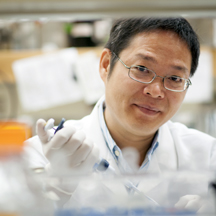Science on Tap talk to focus on the health benefits of promoting beige adipocytes
November 17, 2014
 |
|
Shihuan Kuang |
WEST LAFAYETTE - Purdue animal sciences professor Shihuan Kuang will discuss the potential of beige adipocytes to treat obesity and Type 2 diabetes during the next Science on Tap.
The talk, titled "Overcoming Obesity: Changing the Color of Your Fat," is at 6 p.m. Thursday (Nov. 20) in the upstairs of Lafayette Brewing Company, 622 Main St., Lafayette. The informal lecture, which is free and open to those 21 and older, is sponsored by the Purdue Department of Animal Sciences, College of Agriculture and Discovery Park.
"Interestingly, fat comes with different colors, for example white fat, whose accumulation leads to obesity, and tiny brown fat that is specialized to burn lipids," said Kuang, an associate professor of animal sciences who came to Purdue in 2008. "Recent discovery of lipid-burning beige adipocytes dispersed among white fat provide a novel strategy to overcome obesity."
While children and hibernating animals use brown adipocytes to burn fatty acids and produce heat, adults lose most of their brown adipocytes as they mature, leaving white adipocytes behind to expand. White adipocytes, and the systemic energy surplus that is stored within them, are the primary cause of obesity.
"We have identified the developmental origin of the various types of fat," Kuang said, "and have recently shown that genetic or pharmacological inhibition of a key signaling transduction pathway promotes beige adipocyte formation in mice and improves their insulin sensitivity."
Like brown adipocytes, beige fat cells have the ability to actively burn lipids to generate heat, thus reducing white fat and preventing obesity. The ability to promote specific types of adipocytes opens up a new avenue to treat obesity and Type 2 diabetes, conditions that currently affect one-third of adult Americans.
"Our long-term goal is to translate our results from animal models to humans and benefit the health of humankind," Kuang said.
Kuang received a master's degree in marine biology from the Chinese Academy of Sciences in 1992 and a Ph.D. in physiology and cell biology from the University of Alberta, Canada, in 2002.
His research spans agriculture and human medicine, exploring issues of meat quality and muscle development and repair. He has found that transplanted stem cells survive far better if they are grown in the low oxygen levels native to the human body. This finding could greatly improve the efficiency of clinical practices used to treat muscle-wasting diseases. See related Purdue news release: http://www.purdue.edu/newsroom/releases/2012/Q3/low-oxygen-boosts-stem-cell-survival-in-muscular-dystrophy-therapy.html
In the past two years, he has spoken at seminars and conferences worldwide, including the FASEB Summer Research Conference in Italy, and at least eight other institutions in China. Last spring, he was awarded Purdue's 2014 Agricultural Research Award for his work in stem cell biology and the regulation of muscle and adipose tissues.
Science on Tap, led by graduate students David Welkie, Anju Karki and Nelda Vazquez, provides Purdue faculty and collaborating researchers the opportunity to share research activities in an informal setting with presentations that are designed to appeal to a more general audience. Attendance at the monthly event has averaged 80 during the program's first four years.
Writers: Emily Sigg, 765-494-4719, esigg@purdue.edu
Anna Schultz, 812-447-5229, schult70@purdue.edu
Phillip Fiorini, 765-496-3133, pfiorini@purdue.edu
Source: Shihuan Kuang, 765-494-8283, skuang@purdue.edu

